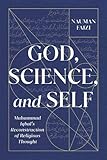God, science, and self : Muhammad Iqbal's Reconstruction of religious thought / Nauman Faizi.
Material type: TextSeries: McGill-Queen's Studies in Modern Islamic Thought SerPublisher: Montreal ; Kingston ; London ; Chicago : McGill-Queen's University Press, 2021Description: 1 online resourceContent type:
TextSeries: McGill-Queen's Studies in Modern Islamic Thought SerPublisher: Montreal ; Kingston ; London ; Chicago : McGill-Queen's University Press, 2021Description: 1 online resourceContent type: - 9780228007302
- 0228007305
- Muhammad Iqbal's Reconstruction of religious thought
- 297 23
- BP161 .F35 2021
- online - EBSCO
- cci1icc
| Item type | Current library | Call number | URL | Status | Notes | Barcode | |
|---|---|---|---|---|---|---|---|
 eBook
eBook
|
Biblioteca "Angelicum" Pont. Univ. S.Tommaso d'Aquino Nuvola online | online - EBSCO (Browse shelf(Opens below)) | Online access | Not for loan (Accesso limitato) | Accesso per gli utenti autorizzati / Access for authorized users | (ebsco)2956626 |
Includes bibliographical references and index.
Sir Syed's Representationalism -- Knowledge, Experience, and Reality -- The Cosmos as Self -- The Human Being as Self -- The Meaning of Revelation.
"Muhammad Iqbal (d. 1938) was one of the most influential modernist Islamic thinkers of the early twentieth century. His work as a poet, politician, philosopher, and public intellectual was widely recognized in his lifetime and plays a major role in contemporary conversations about Islam, modernity, and tradition. The Ambiguities of Modern Islamic Thought examines the patterns of reasoning at work in Iqbal's philosophic magnum opus, arguably the most significant text of modernist Islamic philosophy, The Reconstruction of Religious Thought in Islam. Since its initial publication in 1934, The Reconstruction has left scholars in a quandary: its themes appear eclectic, and its arguments contradictory and philosophically perplexing. In this groundbreaking study, Nauman Faizi argues that the keys to demystifying the contradictions of The Reconstruction are two competing epistemologies at play within the work. Iqbal takes knowledge to be descriptive, essential, foundational, and binary, but he also takes knowledge to be performative, contextual, probabilistic, and vague. Faizi demonstrates how these approaches to knowledge shape Iqbal's claims about personhood, God, scripture, philosophy, and science. The Ambiguities of Modern Islamic Thought offers an original approach to interpreting Islamic thought as it crafts relationships between scriptural texts, philosophic thought, and scientific claims for modern Muslim subjects."-- Provided by publisher.
Description based on online resource; title from digital title page (viewed on July 19, 2021).


